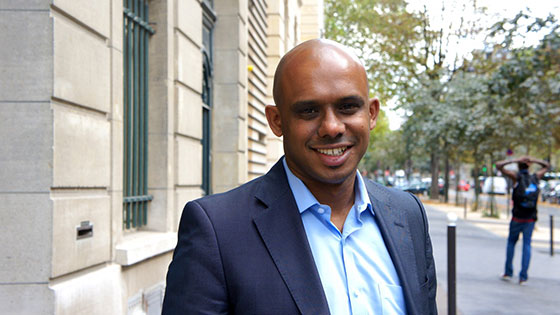
Dr. Sanjeev Sockalingam, Deputy Psychiatrist-in-Chief (TGH & PMH) and Director of the Psychosocial Bariatric Surgery Program University Health Network, is helping to integrate mental health services into programs across UHN. (Photo: University of Toronto)
Dr. Sanjeev Sockalingam has heard many pleas from patients, colleagues, and even close personal friends, asking how they can find a psychiatrist or access treatment for mental illness. With not enough capacity in the health-care system and a bottleneck to get into it, he finds his advice is limited. For him, it shines a light on how disadvantaged patients with mental illness are, even as the health-care system makes headway in so many other areas.
"Mental health patients are not benefiting from the same quality improvements and outcomes that are being realized in conditions like heart disease or cancer," says Dr. Sanjeev Sockalingam, Deputy Psychiatrist-in-Chief (TGH & PMH) and Director of the Psychosocial Bariatric Surgery Program University Health Network. "For example, close to 100 per cent of patients who experience heart failure receive follow-up care from the family physician after being hospitalized, whereas only one third of patients who are admitted to hospital for a psychiatric condition receive similar follow-up care."
With the recent success of the annual Bell Let's Talk Day, Sockalingam is buoyed by the increased public awareness and media coverage of mental illness, yet remains deeply concerned about the challenges that the majority of these patients encounter when they try to seek help.
In a recent
editorial, Sockalingam and his colleague Dr. Paul Kurdyak at the Centre of Mental Health and Addictions (CAMH) highlight how a Canadian-wide initiative called "Choose Wisely" is focused on health care practitioners making evidence-based, cost-effective choices around treatment and care for patients, while reducing the use of those that have proven to have little benefit.
"In mental health, we are nowhere near this stage of refining the system," says Dr. Sockalingam. "Instead of looking at the overuse or misuse of treatment in this field, we need to focus on getting patients access to any kind of care of all, right now it is luck of the draw for those who find their way in to the system."
According to CAMH, one third of Canadians who try to access care for mental health report that their needs are unmet or partially met. Instead of Choose Wisely, these two psychiatrists offer an alternative solution for mental health – "Working Wisely".
This idea focuses on creating new and efficient pathways into the health-care system, which includes a systematic triage and screening process to ensure patients get care based on the severity of their illness. Applying more quality indicators to find the gaps in care and data collection around which models of care are working the best are also key to improving access and outcomes around mental health.
The good news is that when people do get access to care, there are many treatments that are well-tested and effective. Because of this, Dr. Sockalingam is optimistic that the health-care system can improve to meet the needs of patients and he is especially proud of the work being done at UHN to increase mental health care to patients across the organization.
"Mental health at UHN is becoming more integrated into medical teams across all specialties," says Dr. Sockalingam. "We've implemented more screening tools in medical psychiatry and have a growing number of mental health champions equipping inter-professional teams with better tools."With one in five Canadians likely to be affected by mental illness in their lifetime, Dr. Sockalingam believes the tipping point for change in our health care system is near and that the Canadian Mental Health Strategy is an important blueprint to use. More public awareness and decreasing stigma is a great first step – but as more patients come forward, the system must be ready to care for them.
Click here to read Dr. Sockalingam's editorial in the
Ottawa Citizen.
